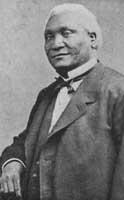Lysius Salomon
| Lysius Salomon | |
|---|---|
 |
|
| 13th President of Haiti | |
|
In office October 26, 1879 – August 10, 1888 |
|
| Preceded by | Pierre Théoma Boisrond-Canal |
| Succeeded by | François Denys Légitime |
| Member of the Provisional Government of the Republic of Haiti | |
|
In office October 3, 1888 – October 23, 1888 |
|
| Minister of Finance, Commerce and Foreign Relations | |
|
In office October 3, 1888 – November 3, 1888 |
|
| Preceded by | Joseph Lamothe |
| Succeeded by | Charles Laforesterie |
| Minister of Finance, Commerce, Foreign Relations, Justice, Education and Worship | |
|
In office February 14, 1851 – January 15, 1859 |
|
| President | Faustin I |
| Preceded by |
Himself (Finance, Commerce and Foreign Relations) Jean-Baptiste Francisque (Justice, Education and Worship) |
| Succeeded by | Victorin Plésance (Finance and Commerce) André Jean-Simon (Foreign Relations and Education) Jean-François Acloque (Justice and Worship) |
| Minister of Finance, Commerce and Foreign Relations | |
|
In office April 9, 1848 – February 14, 1851 |
|
| President |
Faustin Soulouque (as president) Faustin I (as Emperor) |
| Preceded by | Alexis Dupuy |
| Succeeded by |
Himself (Finance and Commerce) Louis Dufresne (Foreign Relations) |
| Personal details | |
| Born |
June 30, 1815 Les Cayes, Haiti |
| Died | October 19, 1888 (aged 73) Paris, France |
| Political party | National Party |
| Spouse(s) | 1) Thulcide Jean-Louis Nicolas Magnus 2) Florence Félicité Poitiez |
| Children | Ida Salomon Faubert |
Louis Étienne Félicité Lysius Salomon (June 30, 1815 – October 19, 1888) was the President of Haiti from 1879 to 1888. Salomon is best remembered for instituting Haiti's first postal system and for his lively enthusiasm for Haiti's modernization.
His daughter Ida Faubert was a French poet.
Salomon was born in 1815 in Les Cayes. His family was influential in the tiny black elite of the south. Prominent and educated, his family often clashed with the relatively more powerful mulatto elite of south Haiti. During the regime of Charles Rivière-Hérard, the Salomons were wanted for arrest after a heated battle with the mulattoes and exiled to Neyba. As Faustin Soulouque came into power, Salomon returned along with other powerful black leaders to serve the new government. Salomon became the minister of finance under Faustin and began to monopolize export transactions in coffee and cotton, run foreign imports through state monopolies, and impose levies on capital. As a result, smuggling and piracy exploded during Soulouque's reign. After the fall of Soulouque, Salomon was exiled to Paris and London, where he read and traveled widely.
On August 18, 1879, Salomon returned to Haiti and became president with huge support from the people. His plan as president was to restart public education, fix Haiti's financial woes, restore agriculture productivity, improve the army, and to fix the public administration. Within four months, he established the National Bank, and by 1880 he resumed debt payments to France. The 1880s saw a huge amount of effort by the Salomon administration to bring modernization to Haiti. He adhered to the International Postal Union and issued its first postage stamp. In October, he granted a British cable company the right to connect Port-au-Prince and Kingston, Jamaica, and by 1887 he negotiated to link Môle Saint-Nicolas to Cuba. He restructured the medical school, imported teachers from France for the Lycées, and more. The armed forces were reorganized to 16,000 and assigned to 34 infantry regiments and 4 artillery regiments. Salomon also reorganized the ranking distribution in the Haitian army, which only included privates and generals.
...
Wikipedia
